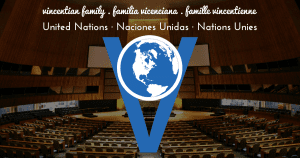
 St. Vincent de Paul was a champion of women. His friendship with St. Louise was evidence of his respect and admiration of women.
St. Vincent de Paul was a champion of women. His friendship with St. Louise was evidence of his respect and admiration of women.
He recognized the strength and unique person of the woman.
The United Nations recently concluded the Commission on Status of Women. Over the course of two weeks every issue important to women, worldwide, was addressed on some level. Representatives of governments, as well as civil society had an opportunity to speak on behalf of women throughout the world, thus representing those who are unable to travel to New York.
While the Commission was very comprehensive, I’d like to highlight a few points.
Some of the speakers highlighted government action, which challenge to promote gender equality. Speakers from Malta, Mongolia, Morocco, the Dominican Republic, Bulgaria and Indonesia described long standing forms of discrimination against women and girls. They recommend campaigns of raising awareness.
Many spoke of the issue of gender based violence. The Mongolian representative stated revamped Law on Domestic Violence had taken effect last month, they were still dealing with compliance.
All presenters spoke of challenges related to decent work, and equal pay for women.
On a more positive note, Helena Dalli, Minister for Social Dialogue, Consumer Affairs and Civil Liberties of Malta, offered a committed feminist agenda. They have an equality and a human rights commission act progressing through the country’s legislature. At the same time, laws are in place on domestic violence and gender based violence which are in compliance with the Istanbul Convention. Malta has also organized a free childcare plan, aimed at providing an incentive for mothers to remain in the labor market. They also have a maternity leave trust fund, financed through small contributions of private companies; it’s been operating for the past two years.
Malta’s employment rate for women has increased from 44% in 2012 to 53.6% in 2015, due to flexible work arrangements and the free childcare.
She also spoke of national efforts to promote education and participation of women and girls in science.
The Commission concluded with a nineteen-page informal paper, urging governments, at all levels to take action to:
- Strengthen normative and legal frameworks.
- Enhance education, training and skills development.
- Implement economic and social policies for women’s economic empowerment.
- Address the growing informality of work and mobility of women workers.
- Manage technological and digital change.
- Strengthen women’s collective voice, leadership and decision making.
- Bolster the private sector role in women’s economic empowerment.
Antonio de Aguiar Patriota (Brazil) Commission Chair Stated, “Realizing gender equality is a truly universal task. He further stated, “It would not come about in this lifetime without decisive commitment at domestic and global levels.”
I view this all through the eyes of a Vincentian. I see great possibility for us to continue our efforts through systemic change, worldwide.
Pattie Hughes, SVdP








Wonderful highlights/summary of two full weeks of discussions and presentations.
Thanks, Natalie. I hope to see you soon.